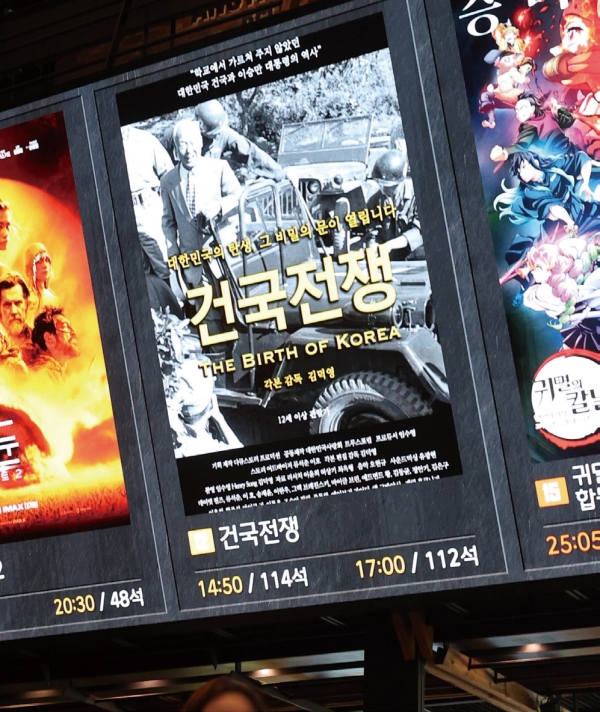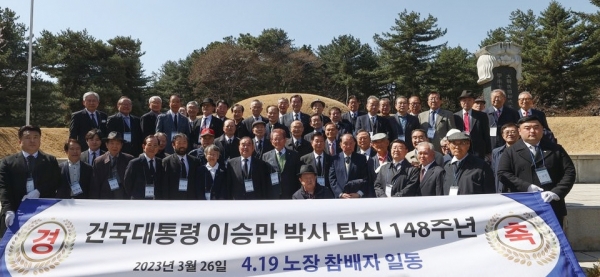Syngman Rhee’s Legacy: A Capitalist Society Despite Controversy, Quarrels with Americans and Leftist Academic Attacks
이승만은 많은 미국 학자들과 선교사들로부터 존경받기도 하고 그렇지 않은 경우도 있었다. 이승만은 1910년 한국인 최초로 미국 박사 학위를 받았다.
지난해 10월 윤석열 대통령이 이승만 기념관 건립을 옹호하는 가운데 발표된 기사에 대부분의 한국인이 이승만에 대해 부정적인 견해를 갖고 있음에도 불구하고 이승만의 프린스턴 동문들이 초기 아시아의 선구자로서 프린스턴에서 이승만의 유산을 더 많이 인정하기 위해 노력하고 있다고 밝혔다. 1978년 프린스턴대에서 경제학 박사 학위를 받은 정운찬 전 서울대 총장(전 국무총리)은 프린스턴 클럽 한국클럽이 약 50만 달러를 모금한 프린스턴 강의실 헌납식에서 연설한 보도를 했다. 1988년 프린스턴대에서 박사 학위를 취득한 김종석 클럽 회장이 시상식에서 “이승만 대통령의 강력한 리더십과 외교력이 없었다면 대한민국은 존재하지도 않았을 것”이라는 발언을 인용 보도하기도 했다.
이승만에 대한 부당한 비판에 맞서 이승만을 변호하는 데 프린스턴과 연계된 사람들은 한국인들만이 아니었다. 나보다 두 학급 앞서 1957년 졸업한 프린스턴 동문 존 에모리 맥케나는 프린스턴 동문 주간지에서 회관 헌정에 관한 기사에서 이승만이 묘사된 내용에 큰 분노를 표했다. “단순히 이승만 대통령의 재임 기간이 부패 혐의로 얼룩졌다고 보도하고 60년대 10년 동안 그의 하야와 냉전시대의 정치가 ‘불행했다’는 인용문을 포함하는 것은 저널리즘이 아니다”라고 맥케나는 불평했다.

이승만 정부 때 부패 문제는 주변 사람들이 관련
신학자이자 시인인 맥케나는 “우리 시대의 학생 시위와 함께 문화적 또는 사회적 변화는 역사가 실제로 무엇인지에 대한 최종 결정을 내릴 수 없다”고 썼다. 남부 캘리포니아에서 한국인과 함께 종교 활동을 했던 맥케나는 북한에서 태어난 한국전쟁 참전 용사인 그의 통역사가 “이승만은 기독교적 성실성을 지닌 사람이었으며, 독립과 통일을 위해 싸우려는 결단의 근본이 되는 사람이었다. 이승만과 관련한 부패 문제는 그와 가장 가까운 사람들과 주변 사람들과 관련되는 것이었다”고 말한 발언을 전했다.
그러나 1948년 대통령 취임 초부터 한국전쟁과 그 여파를 거쳐 1960년 4월 학생혁명으로 물러날 때까지 이승만 대통령의 업적을 자주 비판했던 많은 학자들과 미국 정부 관료들은 어떠한가? ‘외국인 친구: 이승만, 미국의 예외주의, 그리고 한국의 분단’의 저자인 데이비드 필즈는 워싱턴의 우드로 윌슨 센터가 발행한 논문에서 이승만에 대한 세심하고 미묘한 견해를 제시한다.
동아시아 연구센터 부소장인 그는 “이승만은 미국에 의해 임명되기는 커녕 그가 도착하자마자 한국에 주둔한 미군정을 소외시키기 시작했다. 그는 처음부터 한국에 대한 신탁통치 정책을 공격했다. 즉 소련이 협력할 것으로 예상되는 신탁통치 형태 하에 한국이 놓일 수 있는 것은 터무니없다며 즉각적인 독립을 요구했다” 고 말했다.
이러한 해석과는 반대로 ‘미국 외교정책: 역사 및 자원 가이드’는 미국 캠퍼스의 학문적 사고에 만연하는 좌파적 관점을 제공한다. “이승만은 자신의 통치하에 남북한을 통일하기 위해 타협의 여지가 없는 강경한 반공주의자였다. 하지 미군정 사령관도 이러한 관점을 공유했다”고 했다. “미군의 지원을 받아 이승만은 1940년대 억압적인 반격 작전을 시작했고, 이로 인해 남북한 사이에 공식적으로 전쟁이 발발하기 전에 남한은 사실상 내전 상태에 빠졌다”는 것이다.
이 분석은 역사학자 브루스 커밍스의 말을 인용한다. 그는 한국전쟁의 주요 원인이 한국 사회의 지주와 소작인 갈등, 소수의 부자 엘리트와 대다수의 빈곤층 사이의 엄청난 격차 때문이라고 한다. 이에 동의할 수 없지만 이 견해에 따르면 소련에 의해 조선민주주의인민공화국 창건자이자 초대 지도자로 임명된 김일성의 통제하에 있는 북한이 남한을 침략한 책임이 없다는 것과 같다. 그는 미국이 이승만을 지원하기로 결정하면서 전쟁 발발이 불가피해졌다고 주장한다.

이승만은 번영하는 통일국가를 소망
이승만이 전쟁 기간 동안 판문점 평화회담을 통해 남북한 전체를 하나의 자본주의 통일국가로 꿈꾸는 강인하고 의지가 강한 민족주의자였다는 것은 의심의 여지가 없다. 그는 북한에 대한 양보와 한반도의 영구적인 분단으로 끝날 것이라고 생각한 끝없는 평화회담과는 아무런 관련이 없기를 원했다. 회담이 계속되면서 그는 2만5000명의 반공포로를 석방하라고 명령함으로써 미국과 북한에 충격을 줬다.
이전에 떠나라는 제안을 거부했던 이승만은 그를 하와이로 데려가겠다는 CIA 계획에 동의했고 그곳에서 5년 뒤 90세의 나이로 사망했다. 그의 후계자들이 이승만을 이어 민주적이고 경제적으로 선진국인 현대 한국의 역동적인 시스템을 구축할 수 있었던 자본주의, 민족주의 사회를 이뤘다.
번역 미래한국 편집부
Lee Syng-man, more generally known as Syngman Rhee, was a highly controversial leader whom many American academics and missionaries simply did and do not admire. “A pioneering figure with a marred legacy,” is the verdict of an article in The Daily Princetonian, the campus newspaper at Princeton University, from which Rhee in 1910 became the first Korean ever to receive a doctor’s degree from an American institution of higher learning.
The article, published last October as South Korea’s President Yoon Seok-yul was advocating construction of a memorial for Rhee in the face of leftist criticism, said Princeton alumni were pushing “for more recognition of Rhee’s legacy at Princeton as a pioneering figure in early Asian history at the University” despite “most Koreans having a negative opinion” of him. Chung Un-chan, former president of Seoul National University and prime minister of Korea, who received his doctorate in economics from Princeton in 1978, spoke at the dedication of a lecture hall at Princeton for which the Princeton Club of Korea had raised nearly $500,000. The article quoted Jong Seok-kim, president of the club, who got a doctorate in mathematics from Princeton in 1988, as saying at the ceremony that “South Korea may not have existed” had it not been for “Rhee’s strong leadership and diplomatic skills.”
Koreans have not been the only ones with ties to Princeton to rise to Rhee’s defense against what they see as unfair criticism of his record. One Princeton alumnus, John Emory McKenna, who graduated in 1957, two classes ahead of me, responded with great indignation to a portrayal of Rhee’s record in the Princeton Alumni Weekly story on the dedication of the hall. Simply “reporting that President Rhee’s time in office was marked by accusations of corruption and including a quotation that his forced resignation in the decade of the ’60s and the politics of the Cold War was ‘unfortunate,’ ” McKenna complained, “is not journalism.”
A theologian and poet, McKenna lectured the magazine on its duties to its readers. “Cultural or social changes, along with student protests in our times, do not have the last word on what history actually is,” he wrote. At the least, the article could have referred readers to “a more complete appreciation of Rhee’s life and death….” McKenna, who worked with Koreans in religious activities in southern California, reports his interpreter, a Korean War veteran born in North Korea, as having found Rhee to be “a man of Christian integrity, fundamental to his determination to fight for independence and unification of the nation.” He quotes the interpreter as telling him, “Whatever corruption that occurred belonged to those both closest to and surrounding him!”
But what about the many scholars as well as U.S. government officials who often criticized Rhee’s performance from the outset of his presidency in 1948 through the Korean War and its aftermath until his ouster in the student revolution of April 1960? David Fields, author of Foreign Friends: Syngman Rhee, American Exceptionalism, and the Division of Korea, presents a carefully nuanced view of Rhee in a paper published by the Woodrow Wilson Center in Washington.
Fields, associate director of the Center for East Asian Studies at the University of Wisconsin-Madison, writes “Far from being installed by the Americans, Rhee began alienating the American military government in Korea almost as soon as he arrived.” From the outset, “ He attacked the policy of trusteeship for Korea,” the absurd notion that Korea could be placed under a form of “trusteeship” in which the Soviet Union could be expected to cooperate, “and demanded nothing less than immediate independence.”
Contrary to this interpretation, “United States Foreign Policy: History and Resource Guide” offers a leftist view that has come to pervade academic thinking on American campuses. “Wanting to unify the two Koreas under his rule, Rhee was a hardline anticommunist who saw no room for compromise or middle ground,” says this version. “This viewpoint was shared by American Military Government leader John R. Hodge,” the article goes on. “With American military backing, Rhee launched repressive counter-insurgency campaigns in the 1940s that led South Korea into a state of virtual civil war prior to the official outbreak of war between the North and the South.”
This analysis quotes historian Bruce Cumings as writing, “The primary cause of the South Korean insurgency was the ancient curse of average Koreans, the social inequity of land relations and the huge gap between a tiny elite of the rich and the vast majority of the poor.” No way, if we are to accept this view, were the North Koreans, under the thumb of Kim Il-sung, installed by the Soviet Union as founder and first leader of the “Democratic People’s Republic of Korea,” responsible for infiltrating the South, the “Republic of Korea,” with leftist saboteurs. “Historian Bruce Cumings has suggested,” we are told, “that the outbreak of war became inevitable once the U.S. decided to back Syngman Rhee.”
There is no doubt that Rhee, through the war years, culminating in the peace talks at Panmunjom, was a tough, strong-willed, nationalist who dreamed of all Korea, North and South, as one united capitalist country. He wanted nothing to do with the endless peace talks that he knew would end in concessions to North Korea and permanent division of the Korean peninsula, As the talks wore on, he shocked the Americans, and the North Koreans, by ordering the release of 25,000 North Korean prisoners of war who had no desire to return to the North.
Rhee, who had resisted previous suggestions that he leave, agreed on a CIA plan to fly him to Hawaii, where he died five years later at the age of 90. If Rhee failed to oversee the emergence of a free and united Korea, he left a legacy of a capitalist, nationalist society on which his successors could build the vibrant system that prevails today over modern Korea as a democratic, economically advanced nation.
외부게재시 개인은 출처와 링크를 밝혀주시고, 언론사는 전문게재의 경우 본사와 협의 바랍니다.


